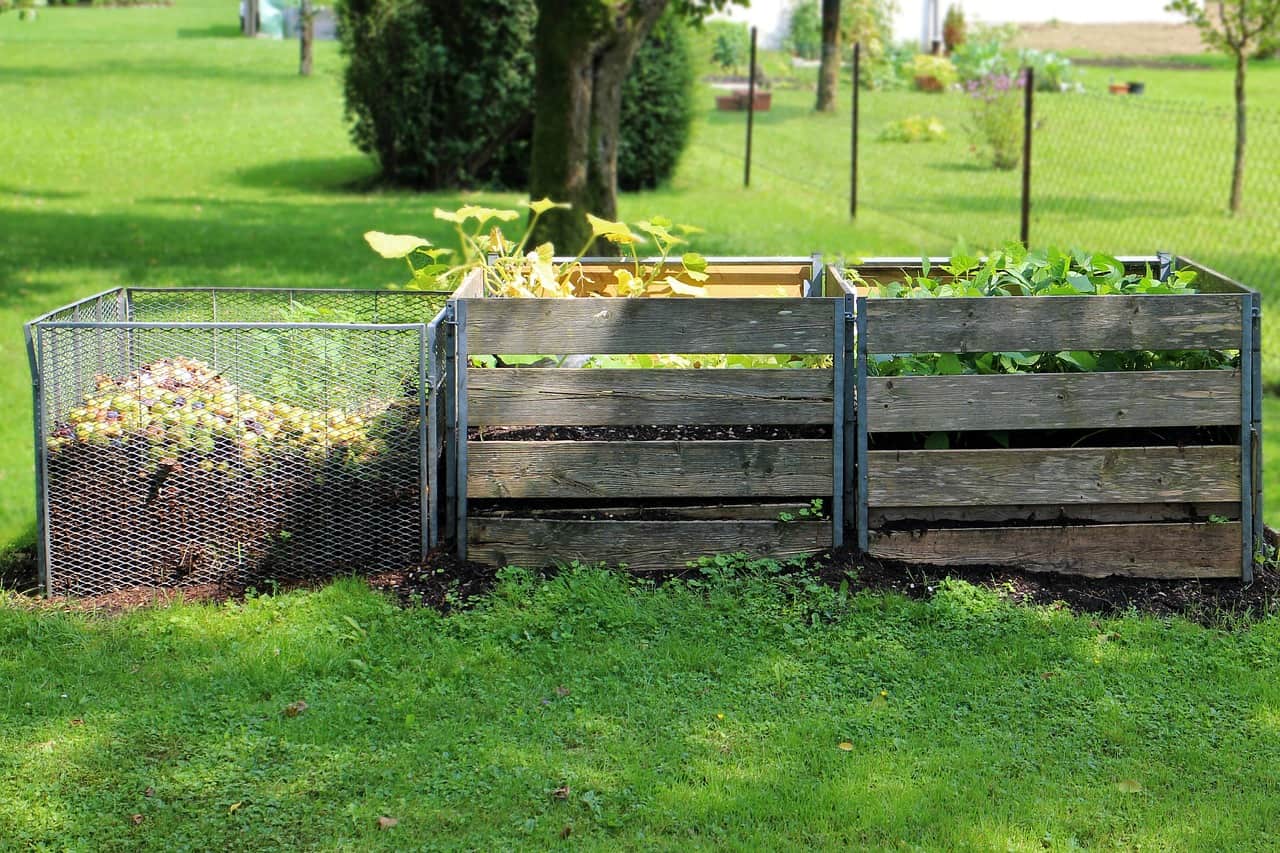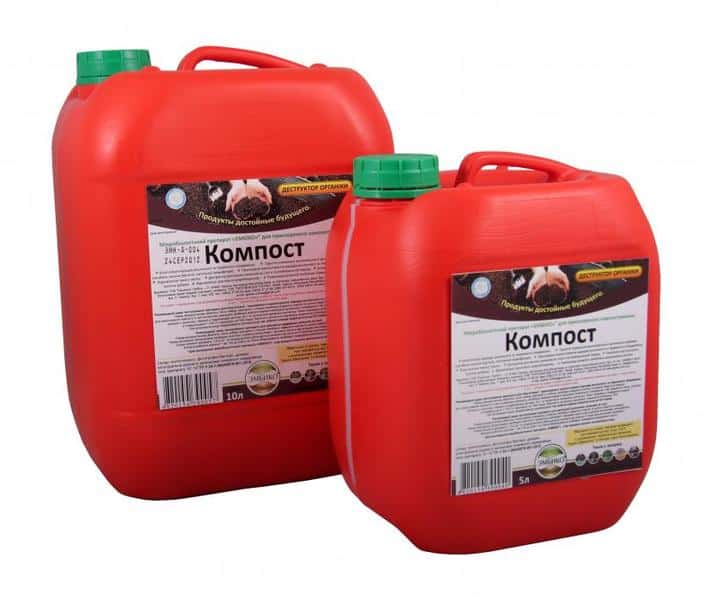Composting in the traditional way and with the help of accelerators
It's hard to imagine a gardener who doesn't have a compost heap. Composting promises undoubted benefits at low cost. What is the composting process and can it be somehow accelerated. Let's try to figure this out.
Composting process
Composting is a dynamic process of processing biomass into humus with the participation of microorganisms. Bacteria (more than 2000 species), fungi (more than 50 species), yeast, actinomycetes, protozoa, centipedes, spiders, ants and other insects take part in it. Each has its own role and each species can exist under certain conditions. Mushrooms, for example, die in places with temperatures above 55 degrees. The number of bacteria in the compost is very high (1 billion per 1 gram of wet matter), but due to their very small size, they make up less than half of the total mass.
As you can see, this is a rather complicated process, therefore, without knowledge and proper timely care, success in creating fertilizer is difficult to achieve.
For composting, it is important to increase the content of nutrients necessary for plants (nitrogen, phosphorus, potassium) by loading various organic matter. It is best to start building a compost pit in the fall, since by this time a large amount of plant waste is already available.
Choose a place. Suitable, for example, a place in the shade, without direct sunlight, where the moisture will be well preserved. In addition, there are likely to be more microorganisms, also necessary for composting.
The compost bale is laid in layers:
- it is important to create drainage from below. You can use branches, spruce branches or straw;
- then lay, alternating, freshly cut grass or weeds, brown stratification without tamping (small branches, paper, coarse tops);
- the next layer of liquid manure (you can use wood ash, nitrogen fertilizers);
- put the ground on top, covering with straw or burlap (for better moisture retention).

Favorable conditions for creating compost
Organic components decompose under the influence of factors such as:
How to improve productivity?We are constantly getting letters in which amateur gardeners are worried that due to the cold summer this year, a poor harvest of potatoes, tomatoes, cucumbers, and other vegetables. Last year we published TIPS about this. But unfortunately, many did not listen, but some still applied. Here is a report from our reader, we want to advise plant growth biostimulantswhich will help increase the yield by up to 50-70%.
Read...
- the presence of oxygen (good air circulation in the compost heap). It is important to periodically mix the entire mass;
- good hydration. All components differ in their ability to absorb water. Based on this, it is necessary to accurately determine the right amount of water for the formation of compost. Wood and fiber materials (bark, sawdust, shavings, hay or straw) can retain 70-80 percent moisture, while green plant parts only a little over 50 percent;
- temperature conditions (above 35 degrees - it will be better to go through the process);
- the presence of nitrogen in sufficient (but not an excess) amount.

Remember that a lack of moisture leads to a cessation of the decomposition process, and its excess leads to rotting of the mass.
All microorganisms that contribute to the breakdown of organic matter are divided into three types:
- psychrophiles (optimal temperature of vital activity below 20 degrees);
- mesophilic (live, develop at an optimal temperature of 20-45 ° C);
- thermophilic (successfully formed at temperatures above 45 ° C).
The initial stage of composting requires constant ventilation and moistening of the organic components in the heap. When the temperature inside the compost heap rises to 70 ° C, the neutralization of substances occurs (destruction of weed seeds, harmful microorganisms).
It is important to maintain the optimal ratio of carbon and nitrogen (25 mass parts to one). Nitrogen creates the necessary conditions for the activity of fungi and bacteria, which contribute to the decomposition process. It is found in freshly cut grass, nettle. Especially a lot of digestible nitrogen in the roots of legumes.
When the temperature rises to 50 and above, organic matter completely decomposes, humus is obtained. The last stage of humus formation occurs at a temperature equal to the environment. During the decomposition of organic matter, heat is released.
To speed up the process and ripen nutrients in the compost heap, special biological products are used. Such a tool, having microorganisms in its composition, begins to instantly process the biological mass.
![]()
The benefits of compost
Let's note the positive aspects of composting:
- harmonious proportion of all trace elements required for plants;
- the nutrients of the compost will saturate the roots of the plants, and will not be washed deep into the soil;
- the resulting humus improves the composition of the topsoil;
- improves the structure of clay soil;
- mixing with sand, it helps to retain moisture, nutritious substances;
- is a carrier of a large number of nutrients, humus (valuable inhabitants of the soil live in it - insects, beetles, worms);
- promotes the appearance of birds that help to destroy small pests of plants;
- the ability to avoid excessive fertilization of seedlings;
- a cheap and effective way to turn kitchen or summer cottage waste into a valuable biomaterial for the soil.
Benefits of garden compost
First of all, plants receive excellent organic nutrition containing important trace elements, humus. In turn, the structure of the soil improves, its structure of friability is preserved, and the ability to retain life-giving moisture increases. Decomposing the compost in a thin layer on the surface of the soil helps to reduce the number of weeds, helps to retain moisture directly at the seedling root.
Self-preparation of humus allows you to:
- keep the air clean (no need to burn waste, fallen leaves, paper);
- refuse to spend on organic fertilizers and on high-quality land for the garden;
- make life easier for the gardener (non-waste production).
The use of such a natural fertilizer is an important part of organic farming.

Use of biodestructors to accelerate the maturation process
Biodestructors are preparations based on living microorganisms (the prefix "bio" - "life"). They include a complex of selection strains of microorganisms, enzymes with cellulolytic activity, as well as various inorganic additives, amino acids, vitamins. These nitrogen-fixing bacteria feed on organic matter (straw, hay) and multiply rapidly on the compost heap. At the same time, they secrete enzymes - accelerators of decomposing processes. Processes that would take years are completed within two to three months.
Therefore, biodestructors are preparations for accelerating the process of maturation of humus, a substance that can be well absorbed by plants.
Benefits of using biodestructors
- waste disposal in an environmentally friendly way;
- obtaining high-quality fertilizer - humus;
- protection from harmful organisms. Bacteria and fungi of biodestructors completely deprive the living space of other harmful microorganisms and secrete natural antibiotics that kill them;
- quick completion of the processing of plant residues;
- an increase in the amount of humus in the soil. For 1 hectare per year, approximately 400-500 kg;
- significant savings due to the rejection of inorganic fertilizers. For example, on 1 hectare of area, you can save up to 100 kg of superphosphate, 30-50 kg of potash fertilizers;
- protection of plants from fungal diseases;
- getting rid of the unpleasant smell of compost waste;
- production of environmentally friendly products;
- increasing soil productivity, as the soil is filled with microelements and vitamins digestible by plants from humus;
- increase in yield up to 10-20%;
Thus, humus for plant fertilizer will improve the yield of any gardener. To do this, you need to create favorable conditions for the compost heap. Monitor constant humidity, replenishment with organic matter. Periodically mix the ingredients so that the pile "breathes". If biodestructors are used, the compost will be processed into humus much faster.
Tool for accelerated maturity of the compost heap
And a little about the secrets of the Author
Have you ever experienced unbearable joint pain? And you know firsthand what it is:
- inability to move easily and comfortably;
- discomfort when going up and down stairs;
- unpleasant crunch, clicking not of their own free will;
- pain during or after exercise;
- inflammation in the joints and swelling;
- causeless and sometimes unbearable aching pain in the joints ...
Now answer the question: does it suit you? Can such pain be endured? And how much money have you already "leaked" for ineffective treatment? That's right - it's time to end this! Do you agree? That is why we decided to publish an exclusive interview with Oleg Gazmanov, in which he revealed the secrets of getting rid of joint pain, arthritis and arthrosis.
Attention, only TODAY!




